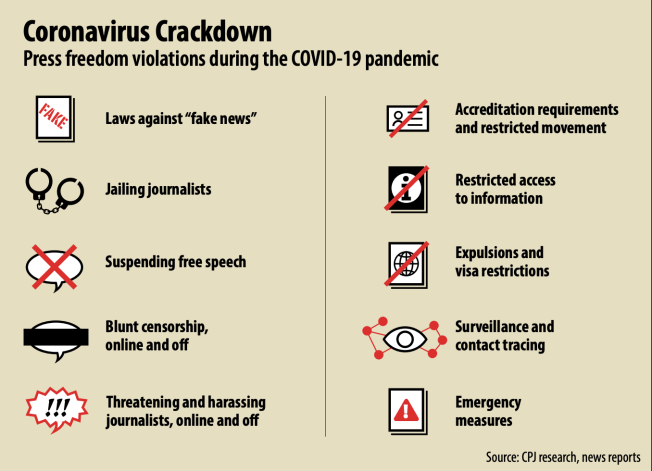The Torch is a weekly newsletter from the Committee to Protect Journalists that brings you the latest press freedom and journalist safety news from around the world. Subscribe here.
The U.S. Press Freedom Tracker, of which CPJ is a founding partner, is investigating reports of at least 280 press freedom violations nationwide. The incidents, tracked since May 26, took place as journalists covered protests over the murder of George Floyd at the hands of police in Minneapolis.
The reported violations include 45 arrests or detentions of journalists, and police attacks on dozens of reporters with tear gas, pepper spray, or rubber bullets. CPJ is horrified by the continued use of harsh and violent tactics by the police against journalists, and calls on them to not target the press.
“The reality is that aggressive, militarized policing across much of the country, combined with a growing number of protesters who are hostile toward traditional media, has made covering protests an increasingly dangerous assignment,” wrote CPJ Executive Director Joel Simon in a column published in the Columbia Journalism Review. CPJ spoke about the unprecedented scale of these attacks with a number of media outlets this week, including Time, The Washington Post, and NPR.
For journalists covering the protests, our latest safety advisory includes advice for how to do so safely.
Journalism in the time of coronavirus
- Authorities in India continue to investigate, detain journalists amid COVID-19
- Journalist in Ecuador hit with bricks in retaliation for his reporting on the pandemic
- Teleamazonas broadcaster attacked with dynamite in Ecuador after the station ran a series of reports relating to the virus
- New analysis from CPJ explores how China’s COVID-19 response has included attacks on the press
- In Nigeria journalist Kufre Carter detained for a month after critical COVID-19 coverage
Spotlight

In a new report, CPJ U.S. Research Associate Katherine Jacobson explored the negative impact of the pandemic on press freedom globally. The report examines different categories of press freedom violations including “fake news” laws, imprisonment, and suspension of free speech.
Though certain dangers posed by COVID-19 will subside with a vaccine, measures introduced restricting press freedom could well continue into the future. Read the full report here and explore our map tracking crackdowns around the world.
What we are reading
- American businesses need news from China. The White House is in the way — Elana Beiser, CPJ editorial director, Business Insider
- ‘The terror of wearing both a press badge and black skin’: Black journalists are carrying unique burdens — Elahe Izadi and Paul Farhi, The Washington Post
- Journalists at George Floyd Protests Are Facing Attacks — Katie Couric, Wake-Up Call
- Watchdogs Say Assaults on Journalists Covering Protests Is on a ‘Scale That We Have Not Seen Before’ — Jasmine Aguilera, TIME
- A Bipartisan Push in Congress to Fight the ‘Parallel Pandemic’ of Human Rights Abuses Abroad — Rob Berschinski and Reece Pelley, Just Security
- America’s rivals return fire on human rights after U.S. protests — Reuters
Beyond the pandemic
- In Cameroon, news reports allege that journalist Samuel Wazizi had died after being tortured by security forces.
- Afghan journalist and media worker killed in bomb attack
- Yemeni journalist and AFP contributor Nabil al-Quaety killed outside his home
- Bangladeshi journalist held in Jordan without lawyer since April
- Mexican reporter’s car firebombed in Sonora state
- Egyptian security forces detain two freelance journalists
- Managing director of Iranian news agency convicted on false news charges
- In Colombia, a shipping container on wheels brings a roving reporting workshop to news deserts
Do you have an Amazon Alexa-enabled device? Enable CPJ's flash briefing skill to stay up to date with the latest press freedom news from around the world.
